Peugeot 508 vs Skoda Superb Combi - Differences and prices compared
Costs and Efficiency:
Looking at overall running costs, both models reveal some interesting differences in everyday economy.
Skoda Superb Combi has a clearly perceptible advantage in terms of price – it starts at 35200 £, while the Peugeot 508 costs 44600 £. That’s a price difference of around 9343 £.
Fuel consumption also shows a difference: Skoda Superb Combi manages with 0.40 L and is therefore clearly more efficient than the Peugeot 508 with 1.60 L. The difference is about 1.20 L per 100 km.
As for range, the Skoda Superb Combi performs convincingly better – achieving up to 134 km, about 79 km more than the Peugeot 508.
Engine and Performance:
Power, torque and acceleration are the classic benchmarks for car enthusiasts – and here, some clear differences start to show.
When it comes to engine power, the Peugeot 508 has a evident edge – offering 360 HP compared to 265 HP. That’s roughly 95 HP more horsepower.
In acceleration from 0 to 100 km/h, the Peugeot 508 is hardly perceptible quicker – completing the sprint in 5.20 s, while the Skoda Superb Combi takes 5.70 s. That’s about 0.50 s faster.
In terms of top speed, the performs better – reaching , while the tops out at . The difference is around .
There’s also a difference in torque: Peugeot 508 pulls clearly perceptible stronger with 520 Nm compared to 400 Nm. That’s about 120 Nm difference.
Space and Everyday Use:
Cabin size, boot volume and payload all play a role in everyday practicality. Here, comfort and flexibility make the difference.
Seats: offers more seating capacity – vs .
In curb weight, Skoda Superb Combi is slightly lighter – 1575 kg compared to 1811 kg. The difference is around 236 kg.
In terms of boot space, the Skoda Superb Combi offers evident more room – 690 L compared to 487 L. That’s a difference of about 203 L.
In maximum load capacity, the Skoda Superb Combi performs slightly better – up to 1920 L, which is about 383 L more than the Peugeot 508.
When it comes to payload, Skoda Superb Combi to a small extent takes the win – 584 kg compared to 469 kg. That’s a difference of about 115 kg.
Who comes out on top?
Overall, the Skoda Superb Combi shows itself to be dominates this comparison and secures the title of DriveDuel Champion.
It convinces with the more balanced overall package and proves to be the more versatile choice for everyday use.
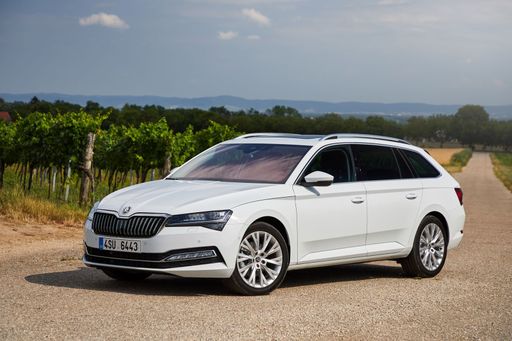 @ Škoda Auto a.s. / Škoda Storyboard
@ Škoda Auto a.s. / Škoda Storyboard
Skoda Superb Combi
Costs and Consumption
View detailed analysis
Engine and Performance
View detailed analysis
Dimensions and Body
View detailed analysis
Peugeot 508
The Peugeot 508 turns heads with a low-slung, almost coupe-like silhouette and a cabin that feels grown-up and surprisingly premium for the money. On the road it balances comfort and poise with a playful edge, making it a convincing choice for buyers who want something stylish and sensible without shouting for attention.
details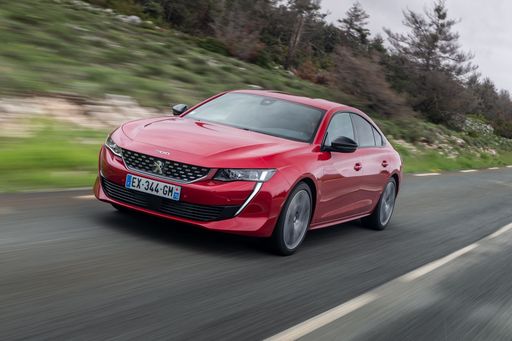 @ Peugeot / Stellantis Media
@ Peugeot / Stellantis Media
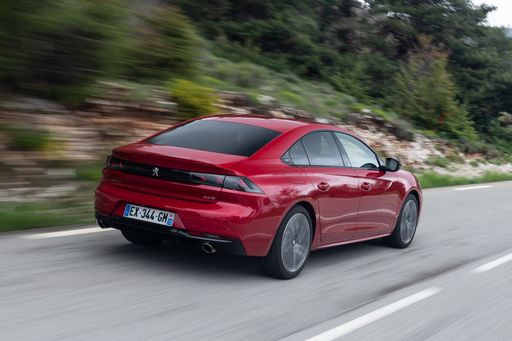 @ Peugeot / Stellantis Media
@ Peugeot / Stellantis Media
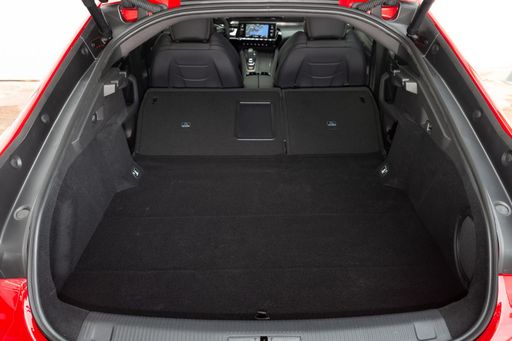 @ Peugeot / Stellantis Media
@ Peugeot / Stellantis Media
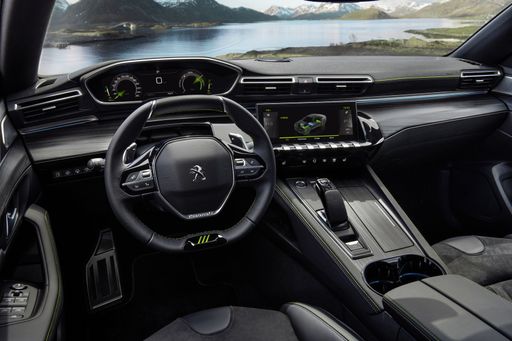 @ Peugeot / Stellantis Media
@ Peugeot / Stellantis Media
Skoda Superb Combi
The Skoda Superb Combi is the practical hero of the estate world, offering cavernous space and a calm, refined ride that makes family life feel effortless. Its clever features, understated design and no-nonsense value make it a smart pick for buyers who want Germanic engineering without the badge premium — and it even manages to stay surprisingly stylish while doing all the heavy lifting.
details @ Škoda Auto a.s. / Škoda Storyboard
@ Škoda Auto a.s. / Škoda Storyboard
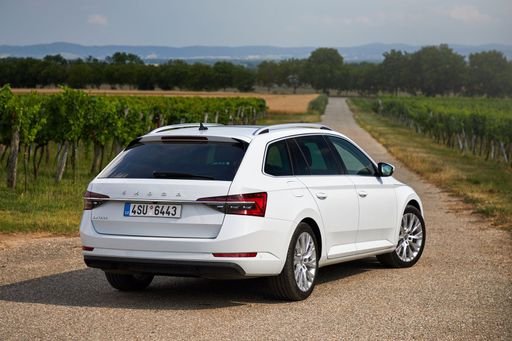 @ Škoda Auto a.s. / Škoda Storyboard
@ Škoda Auto a.s. / Škoda Storyboard
 @ Peugeot / Stellantis Media
@ Peugeot / Stellantis Media
|
 @ Škoda Auto a.s. / Škoda Storyboard
@ Škoda Auto a.s. / Škoda Storyboard
|
|
|
|
Costs and Consumption |
|
|---|---|
|
Price
44600 - 60800 £
|
Price
35200 - 51000 £
|
|
Consumption L/100km
1.6 - 2 L
|
Consumption L/100km
0.4 - 7.8 L
|
|
Consumption kWh/100km
-
|
Consumption kWh/100km
-
|
|
Electric Range
46 - 55 km
|
Electric Range
124 - 134 km
|
|
Battery Capacity
-
|
Battery Capacity
19.70 kWh
|
|
co2
36 - 45 g/km
|
co2
8 - 178 g/km
|
|
Fuel tank capacity
43 L
|
Fuel tank capacity
45 - 66 L
|
Dimensions and Body |
|
|---|---|
|
Body Type
Hatchback
|
Body Type
Estate
|
|
Seats
5
|
Seats
5
|
|
Doors
5
|
Doors
5
|
|
Curb weight
1811 - 1941 kg
|
Curb weight
1575 - 1853 kg
|
|
Trunk capacity
487 L
|
Trunk capacity
510 - 690 L
|
|
Length
4750 mm
|
Length
4902 mm
|
|
Width
1859 mm
|
Width
1849 mm
|
|
Height
1403 mm
|
Height
1482 mm
|
|
Max trunk capacity
1537 L
|
Max trunk capacity
1770 - 1920 L
|
|
Payload
379 - 469 kg
|
Payload
497 - 584 kg
|
Engine and Performance |
|
|---|---|
|
Engine Type
Plugin Hybrid
|
Engine Type
Plugin Hybrid, Petrol, Petrol MHEV, Diesel
|
|
Transmission
Automatic
|
Transmission
Automatic
|
|
Transmission Detail
Automatic Gearbox
|
Transmission Detail
Dual-Clutch Automatic
|
|
Drive Type
Front-Wheel Drive, All-Wheel Drive
|
Drive Type
Front-Wheel Drive, All-Wheel Drive
|
|
Power HP
180 - 360 HP
|
Power HP
150 - 265 HP
|
|
Acceleration 0-100km/h
5.2 - 8.2 s
|
Acceleration 0-100km/h
5.7 - 9.3 s
|
|
Max Speed
230 - 250 km/h
|
Max Speed
220 - 250 km/h
|
|
Torque
360 - 520 Nm
|
Torque
250 - 400 Nm
|
|
Number of Cylinders
4
|
Number of Cylinders
4
|
|
Power kW
133 - 265 kW
|
Power kW
110 - 195 kW
|
|
Engine capacity
1598 cm3
|
Engine capacity
1498 - 1984 cm3
|
General |
|
|---|---|
|
Model Year
2024
|
Model Year
2024 - 2025
|
|
CO2 Efficiency Class
B
|
CO2 Efficiency Class
B, E, F, D, G
|
|
Brand
Peugeot
|
Brand
Skoda
|
Is the Peugeot 508 offered with different drivetrains?
Available configurations include Front-Wheel Drive or All-Wheel Drive.
The prices and data displayed are estimates based on German list prices and may vary by country. This information is not legally binding.
